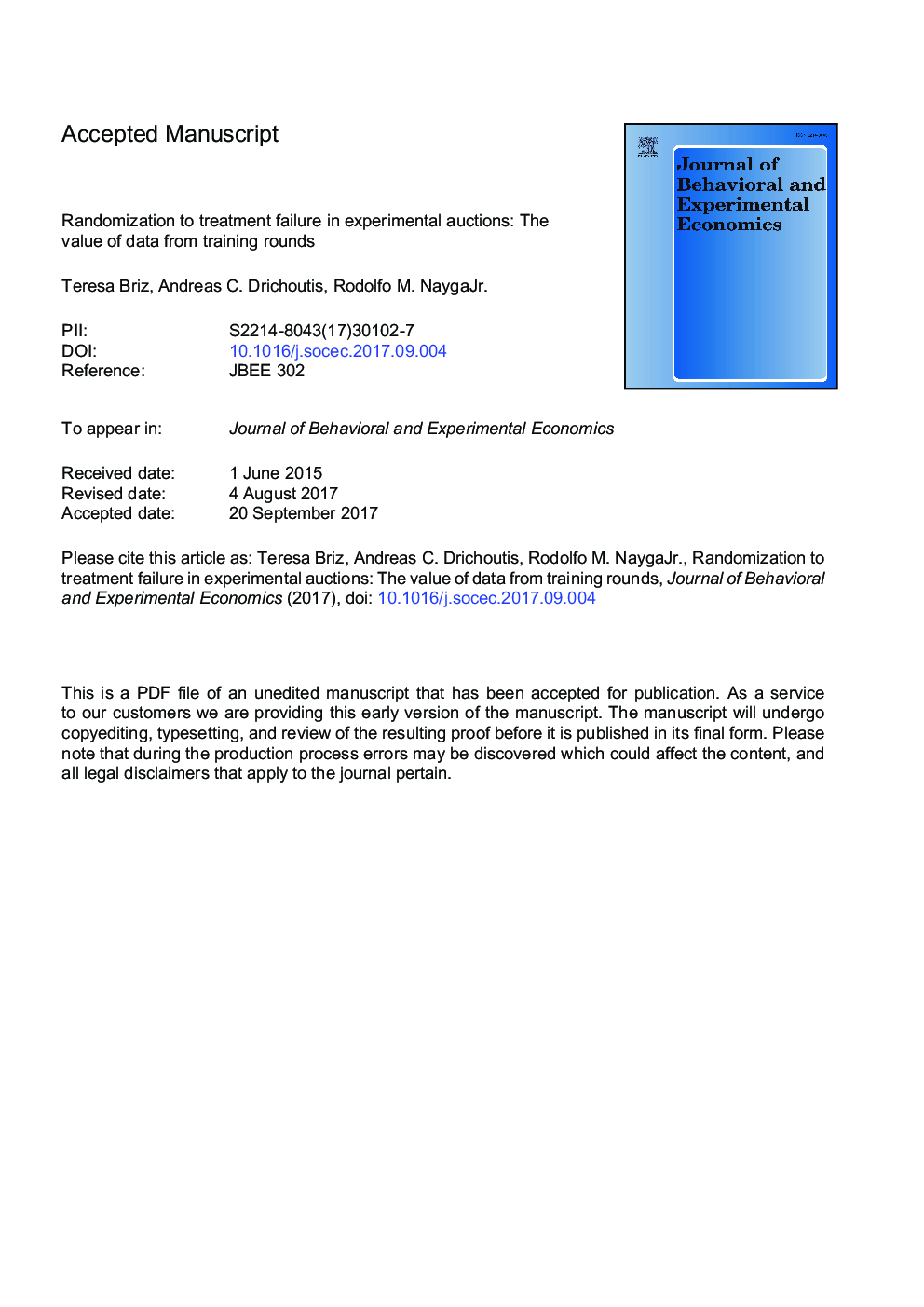| کد مقاله | کد نشریه | سال انتشار | مقاله انگلیسی | نسخه تمام متن |
|---|---|---|---|---|
| 7242050 | 1471543 | 2017 | 32 صفحه PDF | دانلود رایگان |
عنوان انگلیسی مقاله ISI
Randomization to treatment failure in experimental auctions: The value of data from training rounds
ترجمه فارسی عنوان
تصادفی شدن به نقص درمان در مزایده های تجربی: ارزش داده ها از دوره های آموزشی
دانلود مقاله + سفارش ترجمه
دانلود مقاله ISI انگلیسی
رایگان برای ایرانیان
کلمات کلیدی
ترجمه چکیده
در ادبیات مزایده های تجربی، تمرین معمول، آموزش دادن افراد با افرادی که اغلب نا آشنا با روش حراج هستند، با انجام چند مزایده آموزش (اغلب فرضیه) آموزش می دهند. داده های این مزایده های عملی به ندرت در مقالات علمی گزارش می شود. ما استدلال می کنیم که اطلاعات ارزشمندی را می توان با نگاهی به اطلاعاتی که از دوره های آموزشی آگهی های تجربی کسب می کنند، جمع آوری کنیم. ما شواهدی ارائه می دهیم که اگر بینش های به دست آمده از اطلاعات مزایای آموزشی را نادیده گرفتیم، نمی توانیم تشخیص شکست تصادفی بودن را به درمان بدهیم که تخمین های اثرات واقعی علت را با توجه به عدم همبستگی غیرقابل انطباق ارائه می دهد. به عنوان یک مطالعه موردی، ما از داده هایی از یک آزمایش استفاده می کنیم که به دنبال تعریف نقش میانجی کننده حالت های خلق در حالت پیش بینی است. پس از یک روش القای روحی، افراد در معرض منفی (در مقایسه با خلق مثبت) برای محصولاتی که در آینده عرضه می شوند، افراد بیشتری را در معرض منفی قرار می دهند اما برای محصولاتی که در حال حاضر تحویل داده می شوند کمتر تحت تاثیر قرار می گیرند. ما نشان می دهیم که اطلاعات حاصل از جلسات حراج آموزش، اثرات مشاهده شده یک برآورد محو شده را نشان می دهند، که احتمالا ناشی از شکست تصادفی در درمان است.
موضوعات مرتبط
علوم انسانی و اجتماعی
اقتصاد، اقتصادسنجی و امور مالی
اقتصاد و اقتصادسنجی
چکیده انگلیسی
In the experimental auctions literature, it is common practice to train subjects, who are often unfamiliar with the auction procedure, by conducting a few training (often hypothetical) auctions. Data from these practice auctions are rarely reported in scientific papers. We argue that valuable information can be garnered by looking at data coming from the training rounds of experimental auctions. We provide evidence that if we had neglected insights gained from the training auction data, we would not have been able to detect a failure of randomization to treatment that rendered us biased estimates of the true causal effects due to unobserved heterogeneity. As a case study, we use data from an experiment that seeks to elaborate on the mediating role of mood states on projection bias. Following a mood induction procedure, subjects are found to bid more under negative mood (as compared to positive mood) for products that are delivered in the future but bid less under negative mood for products that are delivered in present time. We show that information from the training auction rounds render the observed effect a biased estimate, which is likely a consequence of the failure of randomization to treatment.
ناشر
Database: Elsevier - ScienceDirect (ساینس دایرکت)
Journal: Journal of Behavioral and Experimental Economics - Volume 71, December 2017, Pages 56-66
Journal: Journal of Behavioral and Experimental Economics - Volume 71, December 2017, Pages 56-66
نویسندگان
Teresa Briz, Andreas C. Drichoutis, Rodolfo M. Jr.,
